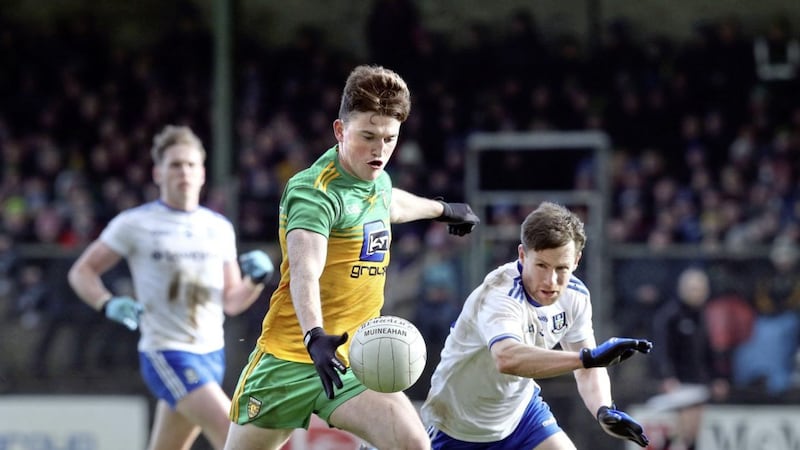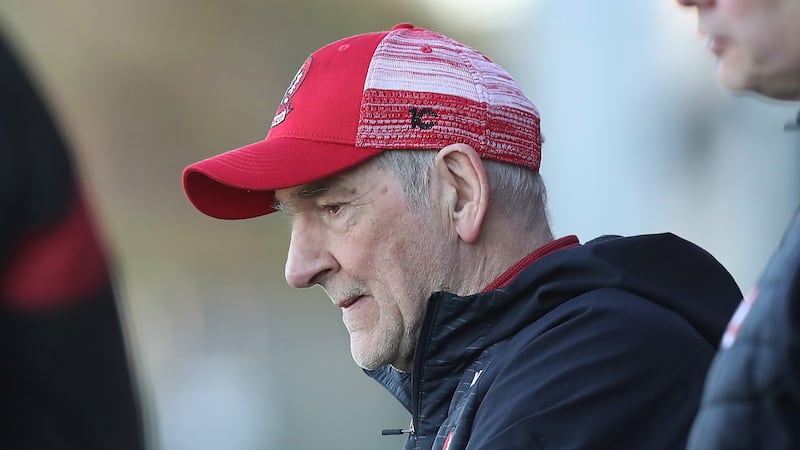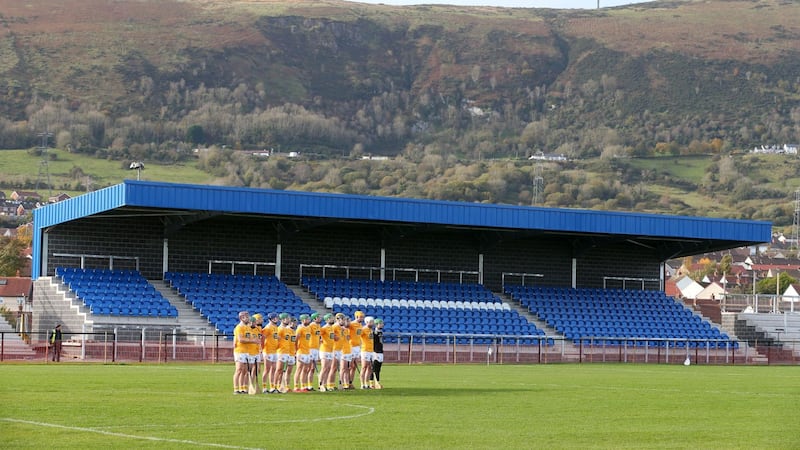DONEGAL have defensive problems – but they aren’t just in defence.
Perhaps it’s the late Spring sunshine and the unusually hardened fields of the Allianz Leagues, but there has been a serious attacking vibe about football in its first two weeks.
In that regard, Donegal have been ahead of the curve. Ever since Declan Bonner took over from Rory Gallagher, they have been very much a front-foot team.
Their whole system is based on control. They have serious lumps of men around the middle of the field.
Murphy, McFadden, McGonigle, Langan, Thompson, enough to rule most skies.
Donegal’s control of the football is not matched by their efficiency in attack.
Case in point, the Tyrone game last year.
Donegal won 50 per cent of their own long kickouts (6/12) and 64 per cent of Tyrone’s (9/14), along with 85 per cent of their own short restarts (11/13).
They owned the ball on a stinking, horrible wet day in Ballybofey, they gave a lot of it away and their attacking results were poor.
They scored 14 times from 26 shots.
In last year’s Ulster final against Cavan, they scored 12 times from 29 shots.
Against Mayo in 2019, it was 11 scores from 27 shots.
Those numbers don’t justify an overwhelmingly offensive approach.
They are prone to such wastefulness that gets hidden because they have so much possession, so many chances and tend to score heavily anyway.
But in the really big games, they have continually fallen down. Defeats by Tyrone (2018), Mayo (2019) and Cavan (2020) have been laid at different doors but the one that keeps coming back is their issues in the full-back line.
Those are undeniable, to a point. But they’ve also become an easy scapegoat for a team that isn’t functioning as a defensive unit.
One of the staples of Declan Bonner’s team in the last four seasons is that he almost exclusively lines out with six natural forwards.
When Donegal have the ball, that is a serious asset. Never was it more apparent than when they steamrolled an Armagh side that had no clue which hole to try and plug, so many were the Tír Chonaill options.
That was built on their domination at midfield and then being efficient with the ball. Kieran McGeeney just last week referenced the 1-6 they scored in eight minutes before half-time.
It was a ruthless spell that accentuated all the positives of playing six natural forwards. When their attacking game clicks, they have such resources that they cannot find a way to shoehorn Oisin Gallen into the team.
But when they don’t have the ball, it seems that Donegal just aren’t good enough.
And while there are issues further back, so much of that stems from their lack of a terrier or two at the top end.
Look at the other teams in contention for the All-Ireland.
Dublin have Niall Scully, with his interminable workrate and engine.
Kerry are currently using Dara Moynihan in the same role, and despite their wealth of options, have rarely sent a team out in recent years that hasn’t had him or Gavin White or Paul Murphy or Diarmuid O’Connor at number 10.
Mayo’s own Diarmuid O’Connor and Kevin McLoughlin have dovetailed in and out of the role.
Conor Meyler was a huge favourite of Mickey Harte’s because of his work ethic, and it seems that Brian Dooher and Feargal Logan have quickly realised his value, with the Omagh man starting the season really well.
It’s a role that has become fashionable, and more notable. Scully’s man-of-the-match award against Kerry might have been debatable simply for the scoring performances on both ends, but he’s got enough of the same crystal at home by this stage that nobody would dare question his worth to Dublin.
Donegal don’t play with that type of player.
And never was it better shown up than at the weekend past.
Monaghan had created eight goal chances by the time Conor Boyle was sent off after 28 minutes. Five of them were created by either Karl O’Connell (2), Ryan McAnespie (2) or Conor Boyle (1) all carrying the ball from deep without any real pressure being put on.
McAnespie then made a run from right-half back all the way to left-half forward in the second half to free Stephen O’Hanlon to set up Conor McManus’ goal.
O’Connell and McAnespie ran the show. Donegal got no pressure on them whatsoever, seemingly caught between two stools.
The yellow shirts don’t tackle high up the pitch and they don’t drop right off either. They gathered in around the middle third but were inconsequential.
It’s the same middle-third press that was equally ineffective for Kerry in 2019 until they sorted it out for the All-Ireland final by dropping deeper and using Paul Murphy as a full-time sweeper.
Donegal are falling into the exact same trap.
They do have definite issues in the full-back line, though the return of Stephen McMenamin will help offset them.
But it’s harsh to lay the whole thing at the door of Neil McGee, Brendan McCole and Eoghan Ban Gallagher. They’re being faced by endless runners and being left constantly trying to split 2v1 situations.
Even in the league game against Tyrone two weeks ago, Michael O’Neill was arguably Tyrone’s best player in the first half hour before he was harshly sent off.
Tyrone ironically didn’t expose Donegal’s frailties because they were so keen to kick the ball that they didn’t really run it too often. But Tyrone did squeeze high up the pitch and forced two turnovers inside Donegal’s 45 that both led to points.
Bonner has a real preference for a half-forward line of Niall O’Donnell, Ciaran Thompson and Michael Langan. But especially if Michael Murphy is not going to be fully fit – he’s the one big tackler they have in attack – then they might need to seriously look at changing that.
Their efficiency in attack isn’t justifying playing with six scoring forwards. Figures in around 50 per cent in big games will not do when you compare it to the benchmark, especially Dublin, who are ordinarily at 70 per cent on a bad day, and around 85 per cent on a good one.
It’s all killing Donegal defensively.
Unless there’s a more defensive-minded player given one of the wing-forward berths, then Donegal’s potential to be a real contender will remain undermined.








